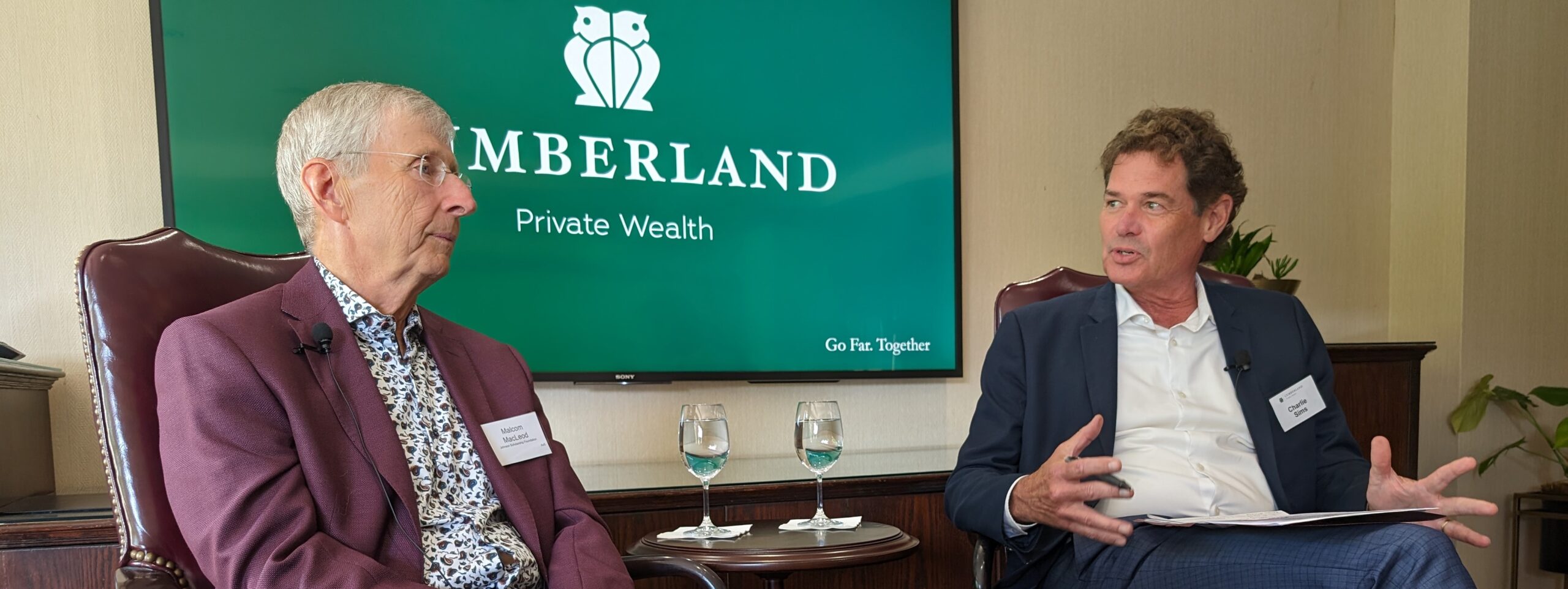Malcolm MacLeod on The Practice of Philanthropy
Steel magnate and philanthropist Andrew Carnegie famously observed that, “It is harder to give money away intelligently than to earn it in the first place.” On June 12, 2024, author Malcolm MacLeod joined the Cumberland Foundations Circle to explain why that’s still true today, and to share learned wisdom from his book, The Practice of Philanthropy: A Guide for Foundation Boards and Staff.
The event was kicked off by Alex von Schroeter, partner on the Cumberland leadership team, who introduced Malcolm Macleod and his wife, Barbara Stanley, who had made a special trip from their home in St. Andrews NB to join us.
Malcolm Macleod was appointed President and CEO of the Johnson Scholarship Foundation in 2001 and held that position until 2020, when he became Board Chair. The Foundation has a private endowment of $250 million and an annual grant budget of $10 million. It makes grants in the United States and Canada and focuses on Indigenous Peoples, the underserved, and people with disabilities. Under Malcolm’s leadership, the Foundation matured from a young family foundation to a high-quality and effective grantmaker. It has achieved top quartile investment returns, developed innovative grantmaking strategies, and attracted a stellar Board of Directors.
After his introduction, Malcolm took the stage along with Cumberland partner and CEO, Charlie Sims, for a conversation about philanthropy that was, by all accounts, informative, entertaining, and inspiring.
A principled approach to philanthropy
Charlie started the conversation by asking why someone with Malcolm’s distinguished career as a lawyer would write a guide to philanthropy. Laughter rippled through the room as Malcolm described confidently accepting his first leadership role in a foundation and thinking to himself, “Grantmaking can’t be that tough – we have the money, and how hard can it be to give away?”
As a lawyer, his first instinct was to seek out precedents for who had successfully done similar work before, but found few that were very satisfactory. He sought out reference books with little luck. He went to conferences seeking continuing education, but none could truly solve the puzzle for him. Ultimately, trial and error turned out to be Malcolm’s best teacher, and The Practice of Philanthropy is his attempt to share what he has learned with others who are facing the unique challenges of effective grantmaking.
A fascinating section of Malcolm’s book deals with what he calls the 10 principles of grantmaking. Charlie asked him to share stories from the book that illustrate the principles in action. Here are two of them:
In 1901, Andrew Carnegie delivered $5.2 million (over $161 million today) in US steel bonds to the director of the New York Public Library. Carnegie went on to fund the building of a 65-branch library system in New York, not to mention 125 free libraries across Canada, many of which are still functioning today. In all, he gave more than $1 billion in today’s dollars to build 2,504 public libraries in the United States, Canada, the United Kingdom, and other countries around the world. The principle in this example is that immersion in a specific area of focus can enable amazing feats of execution.
Another story involved plastic and orofacial surgeon Bill Magee and his wife, Kathy, who founded Operation Smile in 1982 to send US surgeons to developing countries to assist children born with cleft lip and cleft palette. On each mission, they would operate on up to one hundred children, but due to capacity constraints, they were forced to turn away hundreds more. Upon reading about this, a New York ad executive named Brian Mullaney asked, what if they could train local surgeons to do the work instead? Armed with an initial $10 million pledge, he began to build local capacity. His Smile Train initiative has now reached over one-and-a-half million children in ninety countries. The principle? A good grantmaking idea can become a great one if you are willing to experiment and iterate.
Malcolm and Charlie spoke about a wide range of topics over the course of nearly an hour, from the importance of thinking about grants as investments (i.e. knowing what return you are expecting and being patient about getting there) to best practices for investing foundation assets (i.e. having a sound strategy and avoiding the emotional pitfalls that can create a so-called “behavior gap” that prevents you from capturing the full return potential of the market).
Malcolm also discussed sections of his book that touched on issues such as the importance of understanding a foundation’s values, mission and strategy, concepts for effective governance, the value of taking calculated risks, hiring board members, the balance of power between foundations and grantees, and helpful resources, including Philanthropic Foundations Canada and many others.
Following the formal discussion, there was a lively cocktail hour during which attendees from a variety of philanthropic organizations had the opportunity to meet one another and chat with Mr. MacLeod on our rooftop patio.
Join our Circle
Those who steward charitable assets in Canada face a unique set of responsibilities and challenges. Cumberland Foundations Circle was created to help families, foundations, professionals, and experts come together in a dynamic set of discussions to share their knowledge and experiences. To learn more or join the guestlist for a future event, please reach out to us here.



